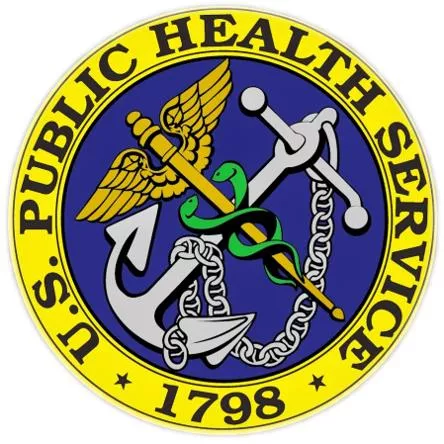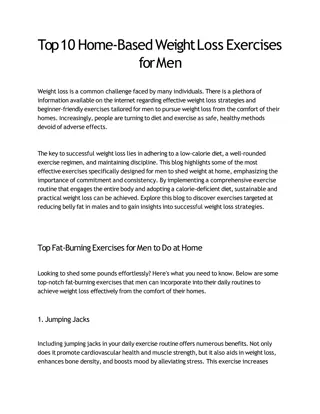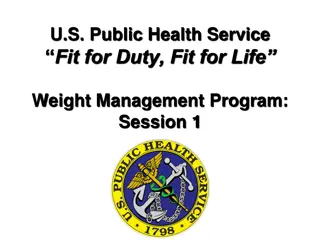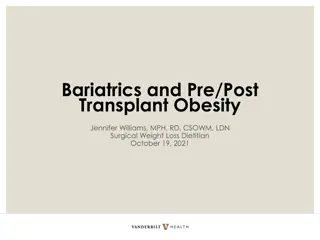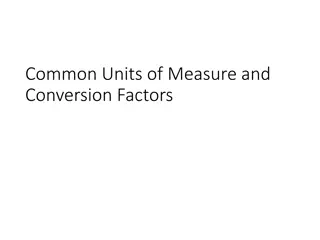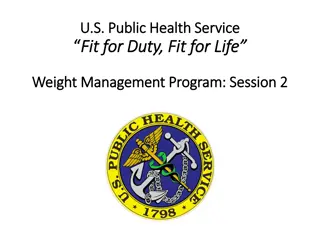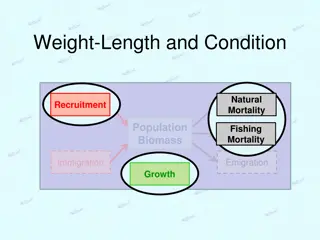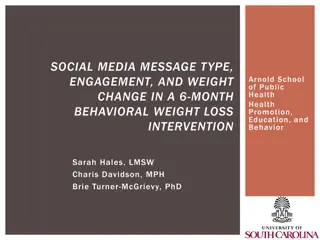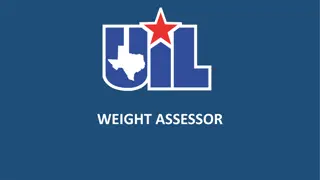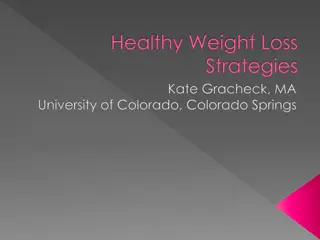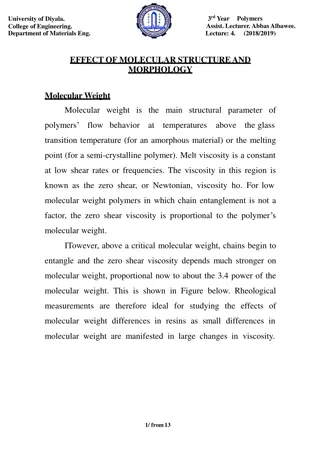Weight Management Program Session Overview
Reflect on your progress, evaluate weight management programs, record thoughts and activities, set goals, and plan for long-term weight maintenance. Suggestions include gradual weight loss, lifestyle changes, and seeking additional guidance as needed.
Download Presentation

Please find below an Image/Link to download the presentation.
The content on the website is provided AS IS for your information and personal use only. It may not be sold, licensed, or shared on other websites without obtaining consent from the author. Download presentation by click this link. If you encounter any issues during the download, it is possible that the publisher has removed the file from their server.
E N D
Presentation Transcript
U.S. Public Health Service U.S. Public Health Service Fit for Duty, Fit for Life Fit for Duty, Fit for Life Weight Management Program: Weight Management Program: Session 6 Session 6
Topics for today Reflecting on how your efforts are working for you Considerations when evaluating weight management programs and options Wrap up and encouragement for continued success These sessions are not meant to substitute for individual recommendations from your personal health care provider(s).
Review of last session 1. Continue to keep food and activity records, adding columns for thoughts and feelings. Were you able to note thoughts and feelings? Did any stand out as significant? 2. Record your screen time How many hours per day on weekdays? Weekend days?
Review of last session, continued 3. Look at antecedents and consequences related to your eating and activity behaviors. Did you find any common antecedents related to your eating and activity behaviors? Were there any consequences? 4. Were you able to accomplish your goals? If yes, how did you feel? If you were not able to meet your goals, why not?
Where do I go from here? Are you pleased with the progress you have made? Have you made some lifestyle changes that will help you maintain your weight loss, and continue to lose weight if desired? What are the next steps for you? Short term goals? Long term goals?
What are the recommendations for weight loss and weight maintenance? Rate of weight loss: 1-2 pounds per week Lose 10% of your weight over 6 months Then, focus on maintaining this weight loss for a period of time; consider additional weight loss
Where do I go from here? Some possible options Satisfied with your progress, plan to continue with your current weight loss plan? Met your weight goal, now aiming for weight maintenance? Need additional guidance, counseling? What are examples of other options available?
Continue with your current plan: Review of Wellness Module Session 1 Continue to keep food and activity records. If you hit a plateau (have not lost weight for a few weeks) this may help you identify possible areas for change. Look for patterns. Set goals to help with your problem behaviors. Are your goals specific, measurable, and realistic?
Continue with your current plan: Review of Wellness Module Session 2 Consume lower calorie, healthful foods. Have you replaced high calorie foods with lower calorie alternatives whenever possible? For example, fat-free skim milk instead of whole milk Are there additional low calorie foods you are willing to substitute? Try new low calorie recipes.
Continue with your current plan: Review of Wellness Module Session 3 Exercise Gradually increase either the intensity and/or duration. Set goals: 2 hours and 30 minutes of moderate physical activity/week or 75 minutes of vigorous aerobic physical activity/week Continue to monitor your target heart rate
Continue with your current plan: Review of Wellness Module Session 4 Pay attention to portion sizes. Check yourself by measuring your portions. Read food labels carefully. When eating out: Choose restaurants that serve healthy low calorie foods. Check the menu beforehand. Ask that menu items be prepared using lower calorie/fat preparation techniques.
Continue with your current plan: Review of Wellness Module Session 5 Antecedents Control your environment (situation and events). Control your thoughts and feelings. Behaviors Eat mindfully. Exercise purposefully. Consequences Reward and praise yourself. Learn from your experiences.
Aiming for weight maintenance? Practice self-monitoring Weigh yourself daily. If greater than 2-3 pound increase, keep food/activity diary for a few days to get back on track. Evaluate any set-backs. Exercise for life: find friends/family and activities that will support your efforts.
More weight maintenance tips Occasionally weigh/measure portions to make sure of amount you are eating. If after holidays, vacations, or special occasions you notice weight gain, return to techniques learned for weight loss until back to your target weight. Don t buy bigger sized clothing. If clothes become tight, it s time get back on track.
Additional guidance If you need additional guidance, some health professionals may be able to help you with your weight loss goals: Registered dietitians Medical doctors Mental health professionals Physical therapists Personal trainers Consult your local care provider for a referral
Weight-loss programs Approximately 8 million Americans enroll in weight-loss programs each year. Programs very widely in terms of success rates; limited data on long term success Some programs make unsubstantiated claims.
Weight-loss program locations and resources May be commercially or privately owned May be hospital/clinic based, community-based, internet-based, or worksite programs May use any combination of the following tools: counselors books, workbooks websites weight-loss products support groups
Weight-loss program services May offer services like: nutrition education physical activity behavior change therapy pre-packaged meals/supplements prescription weight-loss drugs gastrointestinal surgery
Choosing a safe weight-loss program: Program Format Ask the following questions to choose a safe weight-loss program: Does it offer one-on-one counseling or group classes? Do you have to follow a specific meal plan or keep food records?
Choosing a safe weight-loss program: Supplements and Other Purchases Does it require purchasing special foods, prepackaged foods, drugs, or supplements? Special food diets may work in the short term (due to low calorie levels) Long term, may be deficient in certain nutrients your body needs and they do not teach healthy eating habits.
Choosing a safe weight-loss program: Pre-packaged Meals Programs requiring you to buy prepackaged meals may be expensive. Also, eating prepackaged meals does not help you learn food selection and cooking skills you will need to maintain weight loss over the long term.
Choosing a safe weight-loss program: Weight Loss Time- Frame Does it encourage slow and steady weight loss? Be wary, if claims are made for very rapid weight loss. Depending on your starting weight, experts recommend losing 1/2 to 2 lbs per week. Weight loss may be faster at the start of a program.
Choosing a safe weight-loss program: Behavior Changes Does it encourage physical activity, follow a specific exercise plan, or provide exercise instruction? Does the program teach you to make positive and healthy behavior changes?
Choosing a safe weight-loss program: Ask for Professional Qualifications What are the staff qualifications? Who supervises the program? What type of training, experience, education, and certifications do staff have? Do participants talk with a doctor? Will the doctor work with your personal doctor if you have a medical condition and/or taking prescribed drugs?
Choosing a safe weight-loss program: Determine Program Costs and Fees What is the total cost of the program? Are there other costs, weekly fees, food and supplement purchases, etc.? Fees for a follow-up after you lose weight? Fees for medical tests?
Choosing a safe weight-loss program: Evaluate Risks Does the product or program carry any risks? Could the program hurt you? Could the recommended drugs or supplements harm your health? Talk to your health care provider before using supplements, herbs, over-the-counter medications.
Choosing a safe weight-loss program: Verify Past Results What results do participants typically have? How much weight does an average participant lose, do they maintain the weight loss? Are publications or materials available that describe typical participant results?
Choosing a safe weight-loss program: Consult your Healthcare Professional If you are interested in finding a weight loss program, ask your health care provider for a referral or contact your local hospital.
Prescription weight-loss drugs Should be used only by patients who are at increased medical risk because of their weight. Are approved only for those with a (BMI) of 30 and above, or 27 and above if they have obesity-related conditions. Should notbe used for cosmetic weight loss.
Prescription weight-loss drugs, continued Should always be combined with a program of healthy eating and regular physical activity. Lead to an average weight loss of 5 to 22 pounds more than what you might lose with non-drug obesity treatments.
Prescription weight-loss drugs, examples and time-frame Maximum weight loss usually occurs within 6 months of starting medication treatment. Examples: Orlistat Diethylpropion Phendimetrazine Phentermine For additional information, go to prescription weight- loss drugs
Non-prescription weight loss products Over-the-counter (OTC) products may be FDA-approved, or may not go through FDA approval process if considered a dietary supplement Before using any OTC weight loss products, discuss their use with your health care provider.
Questionable weight loss products
Examples of questionable weight-loss products Diet patches "Starch blockers "Fat blockers Glucomannan Guar gum Spirulina "Magnet" diet pills allegedly "flush fat out of the body.
Examples of questionable weight-loss products, continued For more information on questionable weight-loss products, go to: www.fda.gov Beware of Products Promising Miracle Weight Loss
Additional resources on weight-loss programs and products Choosing a Safe and Successful Weight-loss Program Prescription Medications to Treat Overweight and Obesity
Gastrointestinal surgery (also called bariatric surgery) A consideration for individuals with BMI of 40 or greater, or BMI of 35 or greater with other weight- related health problems. Usually lose weight quickly (often 30% of body weight Will need to eat much smaller portions and take vitamin/ mineral supplements
Gastrointestinal Surgery, continued (also called bariatric surgery) Surgery may lead to additional nutritional requirements Seek assistance from a registered dietitian (RD).
Additional resources For the FTC publication Weighing the Evidence in Diet Ads, go to: http://www.ftc.gov/bcp/edu/pubs/consumer/health/hea03.shtm Obesity Medicine Association: https://obesitymedicine.org/
Congratulations! You have successfully completed the U.S. Public Health Service Fit for Duty, Fit for Life weight management program


